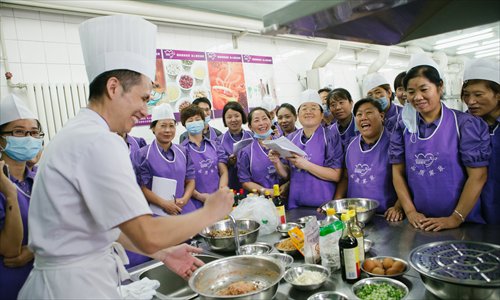
Trainees at Meiyu Home Services have a cooking lesson on August 14. (Photo: Li Hao/GT)
The demand for butlers, often regarded an archaic and unfashionable profession in the UK, is booming in China. The country's butler agencies are finding it difficult to satisfy the growing demand from their wealthy clients, who regard butlers as the latest status symbol on par with Ferraris and Birkin bags. Wannabe butlers are investing tens of thousands of yuan in training on how to properly serve those used to the finer things in life, drawn to the job by the high incomes on offer.
"Remember that the clients' health is the top concern, and we have to design recipes that are conducive to their health," said an instructor to around 30 students in a mock kitchen in a red-brick building in eastern Beijing.
The students were mostly women dressed in purple uniforms and aprons. One of them, Qiu Lanying, a 38-year-old from Yiyang, Hunan Province, listened attentively, nodding and taking down notes as she listened.
Here at Beijing's biggest butler agency, people aspiring to serve the city's elite are being trained in etiquette, cooking, cleaning and basic management skills. Qiu paid 11,874 yuan ($1,855) for the four-week course, and she thinks it's a worthwhile investment - she learned on the Internet and from the instructors that a butler's average salary is 10,000 yuan to 20,000 yuan each month, and those at the very top of the industry in Beijing can command over 35,000 yuan a month plus bonuses. This is higher than the salary of junior managers in large companies.
Competition is fierce among the trainees. After they graduate, they need to complete a six-month internship at the company's headquarters, a villa designed to resemble the homes of their future clients, before the company singles out the best students and dispatches them to clients' homes, often in a group.
"Each group consists of a butler, their assistant, a cleaner, a chef and a chauffeur. The annual fee is usually around 700,000 yuan," Liu Yang, CEO of Meiyu Home Services, told the Global Times. "We receive so many requests that we find it hard to meet the growing demand. It's normal for clients to wait a month before we can find butlers for them."
Liu, originally from Heilongjiang Province, opened Meiyu Home Services in 2003 after she graduated with a hotel management degree from a Swiss college, hoping to cater to the rising demand among wealthy Chinese for elegant, educated home service workers. Her clients are some of the richest people in the country, mostly real estate developers and business owners, she said, who find that normal domestic helpers are unable to satisfy their needs.
A new old-style concept
While Meiyu takes a local approach to the butler profession, the International Butler Academy, headquartered in the Netherlands, is bringing authentic European butler training to China. The school opened its only foreign branch in Chengdu, Sichuan Province last July, charging 40,000 yuan for a six-week course. So far, 47 students have graduated from the academy.
Here, all students are given a traditional three-piece butler uniform, plus two white shirts with French cuffs and four pairs of white gloves. They're also given a large suitcase, suspenders, a tie, armband and a pocket watch, among other accessories, which are included in the tuition fee.
"The growth of wealth in China is certainly contributing to the growing demand for butlers. The high number of millionaires that are created here means our potential [pool of] clients are growing steadily," Thomas Kaufmann, director of training at the International Butler Academy China, said.
"It's going into the direction that we're going to be very busy for the future, and the demand is overwhelmingly high," he said.
According to the 2014 Hurun Wealth Report, by the end of 2013, the number of millionaires - those with a personal wealth of over 10 million yuan - in the Chinese mainland reached 1.09 million, an increase of 40,000 from the previous year. Among those, the number of super-rich individuals, whose personal wealth exceeds 100 million yuan, reached 67,000.
The rising fortunes of China's wealthiest makes them eager to imitate the charm and sophistication of European-style old money.
The super-rich, according to the Hurun report, own four cars on average and their homes are worth an average of 20 million yuan. They collect wines, Chinese calligraphy and paintings and like to spend their vacations travelling abroad or sampling fine tea. Golf is their favorite sport, and 14 percent have personal physicians.
Hiring a family butler is the latest trend, a status symbol just like a Birkin bag, a Ferrari or Patek Philippe watch.
But not everyone who hires a butler understands the essence of the profession. The modern-day butler is more like a personal assistant who manages the house, give orders to the chef, the cleaner and other home service personnel, books the clients' trips and helps plan events.


















































